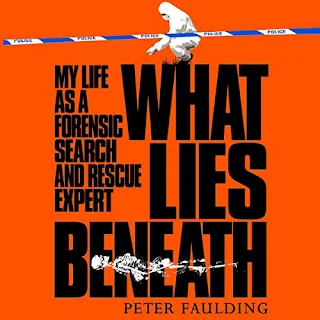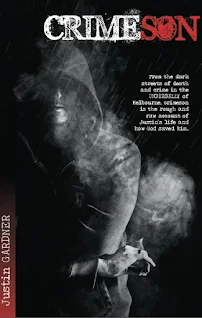Peter Faulding has had a stellar career, and in What Lies Beneath - My Life as a Forensic Search and Rescue Expert I was looking forward to reading all about it. Why the one star rating? I'll get to that.
Faulding grew up in England, caving and exploring mines with his Dad from a very young age, and this went on to form the early beginnings of an impressive career in search and rescue. Becoming more adept at exploring, charting and shoring up mines and tunnels, Peter and his Dad became known by the local fire and rescue squad, volunteering their time when a novice caver was lost or needed rescuing. This knowledge was soon sought after by the UK Search & Rescue Teams (UKSART) and Faulding's career took off, despite never specifically qualifying or following the traditional hiring process.
Faulding served in the military for six years as a military parachutist, and left seemingly to expand his search and rescue business, Specialist Group International (SGI). His interest in developing his own capabilities and skill set led him to become a qualified diver and his searches then expanded to include drownings and body retrievals.
Faulding is an unapologetic high achiever, however his attitude started to tick me off. On locating the body of a man who had drowned, Faulding overheard distraught loved ones discussing the idea of raising funds for the victim's family. The deceased had fallen out of a boat and subsequently drowned, allegedly because he wasn't wearing a life vest. Faulding is tired of attending senseless drownings and approaches the family. He tells them he couldn't help overhearing, but if loved ones wanted to raise some money for the family, perhaps some of it could be spent on life vests for their boat. Well intentioned, sure, but definitely not the time or place for this unsolicited 'advice'.
In Chapter 6, just as he says he: "felt an acute sense of responsibility to conduct the job that we had to do with sensitivity and dignity." Faulding later remarks, "I remember being surprised at how quickly the flies found him." Ummm, what? The author makes this same observation about flies finding the bodies several times and I found it inappropriate and disrespectful to the victims and their loved ones.
Faulding's business SGI is engaged to remove protestors who have tunnelled below the proposed site of a bypass, and 'locked on'. The extent to which environmental protestors in England go in order to disrupt a development, or halt a bypass was eye opening. Staying underground for days at a time, and often dangerously cementing themselves and locking each other to obstacles to slow down the rescue process. In many cases, protestors needed to be cut free from some nasty obstacles and many remained locked-on for days on end, relying on the rescuers for nourishment.
These confined space rescues made me squirm with secondary claustrophobia, but other than telling us protestors left bags of their excrement for rescuers every day, he doesn't really describe what it's like to have to lay on top of a person in order to free them from their lock-in. Faulding seems to respect the ingenuity and dedication of the protestors while reminding the reader how lucrative the work is. He makes sure to mention that for this job he went and purchased some quad bikes, and for this rescue a few vehicles, or a soft top Aston Martin DB7 Vantage Volante to celebrate a month long project. Spare me!
The cases of freeing environmental protestors at various sites became quite repetitive and seemed to blur into one another. The only relief came when the author bragged about purchasing another cutting edge piece of equipment that nobody else was using in the UK at the time.
It seems Faulding regularly travelled in search of emerging technology, expanding into ground penetrating radar, underwater remotely operated vehicles (ROV) and more, being sure to tell us the price tags along the way. Faulding's team were now being hired to search areas for human remains, giving rise to a few chapters on true crime and helping law enforcement. Even here Faulding's arrogance shines through.
Using his years of experience of tunnels and sediment, Faulding began to develop a 'sixth sense' (my words, not his) about where human remains were likely to be found. He mentions a few well known cases, and one in particular when a detective told him an area had already been searched and wouldn't allow SGI to search it again. Reflecting on news the body was later found in that area, Faulding takes the trouble to point out that if he'd been able to search where he wanted to, the family would have been spared years of anguish.
It's not the first time Faulding clashes with SIOs or members of the Police. His expertise becomes so specialised that he's contacted by all levels of government, and I'm not even joking when he says some of them are highly confidential so he can't mention them.
"I had contacts in so many agencies by now, some of which were highly confidential so I cannot mention them. But if something needed to be searched, we were the first port of call." Chapter 9Did you hear that? That was the sound of my eyes rolling back into my head and squelching back down. In his words:
"Every stone needs to be overturned, every hunch followed, and every piece of information followed up on. I made sure I went into every job with an open mind and a commitment to see it through, for as long as it took until I could be confident that I had searched everywhere. Of course it was disappointing when I couldn't find anything, but at least I could console myself with the knowledge that I didn't find anything because there was nothing there. Not because I hadn't looked hard enough." Chapter 11If you're still thinking to yourself, 'well, that's not too arrogant, where's the harm in being confident about your work?'
"Often the range of call outs we were engaged in swung from the sublime to the ridiculous. I was highly regarded and my work was appreciated. I had skills that were valuable, I could search underwater, under buildings, in drains and tunnels, I could climb buildings, look in gutters. I was useful, a problem solver, a search Swiss Army knife." Chapter 11Peter Faulding comes across as competent, knowledgable and an expert in his field, whilst also being disrespectful, condescending and arrogant. I wonder if some of this arrogance would have been written out if he'd worked with a ghost writer or a biographer.
Waiting at a scene for a Doctor to declare a deceased and mummified victim's remains, the author recounts the following interaction:
"A young Doctor turned up about an hour later. She had a stethoscope around her neck. 'Where is he?' she asked as she walked through the front door. 'I'll show you' I said, leading her to the garage, 'you won't be needing the stethoscope'. 'I'll make that judgement' she said curtly. We arrived in front of the body bag, and I crouched down and looked up at her. 'Are you ready with your stethoscope?' I asked. I then unzipped the bag, and opened it up. She recoiled slightly at the sight, she was not amused." Chapter 16We've all worked with people like this and they're far from funny. When proactively engaged in flood rescue, Faulding warns authorities that the river is going to burst its banks, but the experts disagree. The river floods and the author can't resist an 'I told you so', crowing:
"I'd never seen anything like it, I had predicted it was going to happen, but no one would believe me, and that was the disappointing bit. We rely on computer models for everything, but unfortunately they are not always right." Chapter 18And he is? Again, spare me! The author rails against figures in authority who wouldn't, couldn't or didn't listen to his advice and there are plenty of instances in this memoir of 'I told you so', or 'if you'd listened to me....'. In fact, in the case of Nicola Bulley, best summed up in this article from The Guardian, ‘She’s not in the river’: diving expert in Nicola Bulley case under the spotlight, Faulding even goes so far as to engage in some obvious point scoring.
There is very little in the memoir about the author's personal life or any internal growth shared. The fact that a protestor by the name of Swampy receives more air time in this memoir than his first wife Mandy and their two daughters, came across as insensitive and unfeeling. Short shrift was given to their eventual separation, which didn't come as a surprise to the reader after countless mentions of family holidays abandoned. The author spends many weeks and sometimes months away from family on rescue missions; searching crime scenes; or purchasing, testing and learning how to use new equipment. He even devotes time away from family to get his helicopter and fixed wing pilot's licences in the UK and the USA. I mean, come on this guy!
Just when you think there can't be any more, the author enlightens us about 'his' plan for a nation wide water safety scheme, where schools can loan out life jackets like a library book. Working with others, generous crowdfunding and more, he makes sure to look the hero as he tells us:
"In my own time, and at my own expense, I delivered the lifejackets to schools in my helicopter all over the UK." Chapter 20If my loved one were ever missing, Peter Faulding is the man I'd want searching. It seems to me that he's top of his field, but 'what lies beneath' is an arrogant man with a rather large ego.














































